Few bands make it to 20 years.
Fewer still reach that milestone and have the strength to push forward and create arguably their best material. To that end, it’s been a trying slog for The Nation Blue: the band formed in Hobart during the mid ’90s, cutting their teeth within the city’s underground punk-rock scene. Not many bands find success in Hobart and those that do tend to quickly relocate to the Australian musical melting pots of Sydney, Melbourne or Brisbane. After all, Hobart can prove tight to the point of claustrophobic, even if it does have the power to sometimes breed a unique artistic vision in all that isolation.
Tom Lyngcoln has that vision. The man who fronts The Nation Blue holds nothing back: he and his band came to Melbourne at the start of the century and though they were outsiders to begin, quickly garnered a cult following due to their visceral live shows.
Lyngcoln’s onstage persona projects a veil of danger and despair, while his lyrics are a harrowing reflection of his dark sensibilities and his guitar style is akin to a sonic assault. “The physical intensity just comes from years of repeated abuse,” he says. “It’s doing the same thing night after night: people expect to see it so you’ve got to up the stakes.”
But when talking with Lyngcoln, it immediately becomes apparent that there’s a difference between the performer and the man. To speak to, he is refreshingly modest and makes constant references to his day job as a carpenter and newborn child. Indeed, he doesn’t seem to be in any mood to reflect on the positives of the band’s achievement.
“I look up at a lot of the venues around the country and there’s always some evidence that we’ve played there,” Lyngcoln says, the closest he comes to straying into self-promotion. “I’ve had to take stock on a few of the things I’ve done over the years. We did a gig in Sydney where I completely destroyed the roof: I got yanked off stage by bouncer and it took a while for everything to calm down.”
How does one destroy an entire roof? “Ah you take your guitar and just repeatedly smash it through the roof until it just rains asbestos,” says Lyngcoln, deadpan, though he does admit he offered to repair the damages.
After a seven-year hiatus, the band is now embarking upon a new era. With each member fresh from other musical projects, their 20th anniversary now coincides with the release of not one but two new albums, Black and Blue. So why did the band decide to release two records at once?
“I had a child halfway through the process and had a lot of downtime and I found a formula that really worked for me,” Lyngcoln says. “Cranking out 29 to 30 songs was pretty easy to be honest. We had the time and the resources and realised we had two distinct records sitting there so we put them out.” With an excess of new material that stretches far beyond what actually ended up on the albums, Lyngcoln admits that these days he struggles to pick up a guitar, such is the amount of writing he has done.
While both Black and Blue maintain the unnerving punk stamp of their earlier records, the differences between the two albums lie in their themes. “Black is definitely the one that when lyrics started coming through, they were political,” Lyngcoln says. “But on Blue they are more personal. It’s a real clusterfuck on Blue:a lot more personal stuff.”
Given these dark themes are similar to subject matter Lyngcoln has explored before, he does admit to worrying he might go stale. “I’m pretty fastidious with the lyrics,” he says. “I’m always wary if they drag on, but I got on a couple of them here that I was pretty happy with. But I’m about 160 songs deep with all the bands I’ve been in, so I’m starting to run out things to say that’s for sure.”
Fortunately years of touring and recording have given him the chance to get to a place where he seems to find solace in his own creative output. “Over the years perspectives change a bit, but beyond that, there are definitely a few themes that have been overused and you have to be a master of disguise to dress those things up in a different wig to make them sound different.”
The Nation Blue will commence its album tour this month, a series of sets that will include a short run of three east coast shows and the hometown show in Hobart. Lyngcoln is unsure what will happen afterwards though, and it’s evident that the band is often in a state of real flux.
“I don’t know how long the period of activity is going to last for: this time we’re just rehearsing, rehearsing, rehearsing,” he says. “For the limited amount of shows we’re doing there’ll be as much bang for your buck as possible.” Don’t fret then: it’s unlikely the band will end at this point, particularly given it seems like it’s just hit an all-time high. Though The Nation Blue are older and wiser, they’ve never lost their edge. How’s that for a band who have been kicking about for more than two decades?
BlackandBlueis out Friday October 14 through Poison City.The Nation Blue play theFactory Floor onFriday October 14.

































